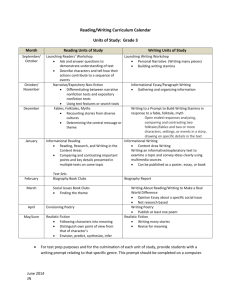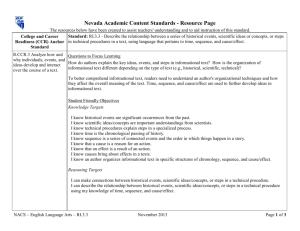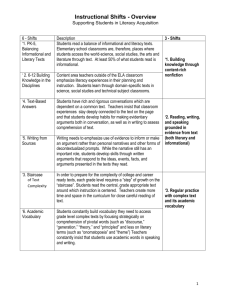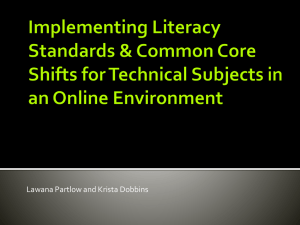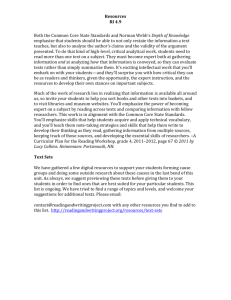Content Area Reading
advertisement
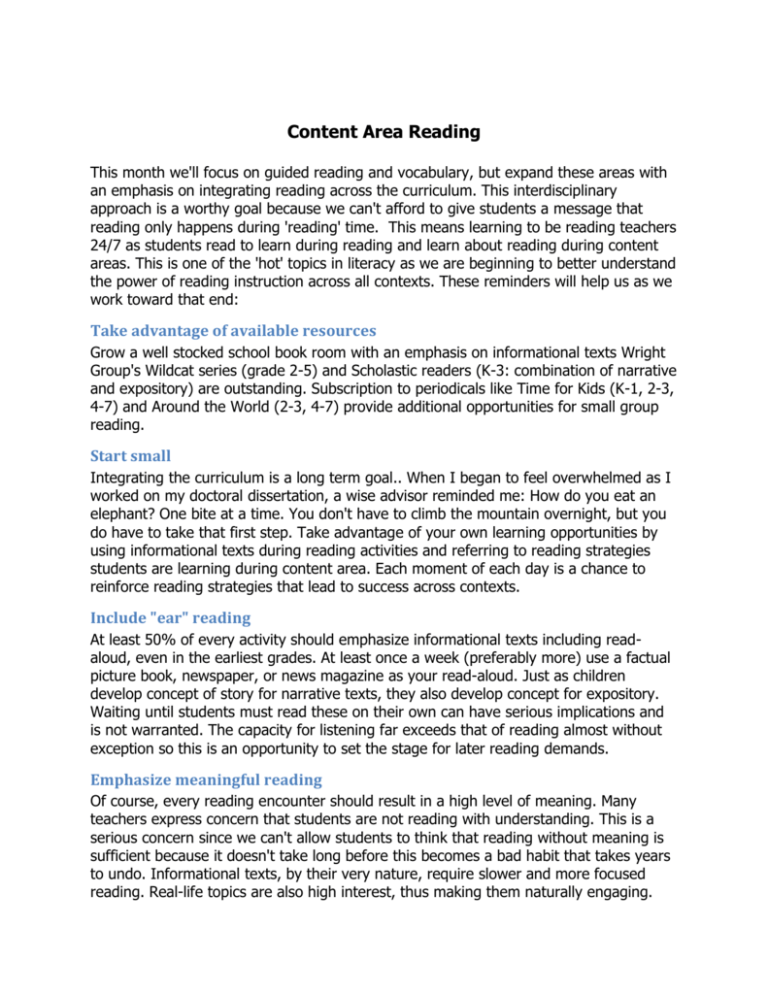
Content Area Reading This month we'll focus on guided reading and vocabulary, but expand these areas with an emphasis on integrating reading across the curriculum. This interdisciplinary approach is a worthy goal because we can't afford to give students a message that reading only happens during 'reading' time. This means learning to be reading teachers 24/7 as students read to learn during reading and learn about reading during content areas. This is one of the 'hot' topics in literacy as we are beginning to better understand the power of reading instruction across all contexts. These reminders will help us as we work toward that end: Take advantage of available resources Grow a well stocked school book room with an emphasis on informational texts Wright Group's Wildcat series (grade 2-5) and Scholastic readers (K-3: combination of narrative and expository) are outstanding. Subscription to periodicals like Time for Kids (K-1, 2-3, 4-7) and Around the World (2-3, 4-7) provide additional opportunities for small group reading. Start small Integrating the curriculum is a long term goal.. When I began to feel overwhelmed as I worked on my doctoral dissertation, a wise advisor reminded me: How do you eat an elephant? One bite at a time. You don't have to climb the mountain overnight, but you do have to take that first step. Take advantage of your own learning opportunities by using informational texts during reading activities and referring to reading strategies students are learning during content area. Each moment of each day is a chance to reinforce reading strategies that lead to success across contexts. Include "ear" reading At least 50% of every activity should emphasize informational texts including readaloud, even in the earliest grades. At least once a week (preferably more) use a factual picture book, newspaper, or news magazine as your read-aloud. Just as children develop concept of story for narrative texts, they also develop concept for expository. Waiting until students must read these on their own can have serious implications and is not warranted. The capacity for listening far exceeds that of reading almost without exception so this is an opportunity to set the stage for later reading demands. Emphasize meaningful reading Of course, every reading encounter should result in a high level of meaning. Many teachers express concern that students are not reading with understanding. This is a serious concern since we can't allow students to think that reading without meaning is sufficient because it doesn't take long before this becomes a bad habit that takes years to undo. Informational texts, by their very nature, require slower and more focused reading. Real-life topics are also high interest, thus making them naturally engaging. Less is more For some reason, we think that more pages must mean more engaged reading as far too much time is spent focusing on longer selections (including lengthy basal stories). Powerful reading has little to do with the number of pages and everything to do with the intensity of the reading activity in that how much is less important than how deeply. If you want to get the most out of your reading lessons, select shorter stories and articles with opportunities to emphasize quality over quantity. The payback is great when students must place more concentrated effort on their reading. Two steps back for three steps forward As you are looking for a set of leveled readers, remember to move to an easier level when you are selecting informational texts over narrative. A slower pace with more focused attention is needed when reading expository texts so it will be entirely appropriate to give students reading at a 3.5 grade level a 2.5 text level when informational texts are the focus. Make study skills a daily goal Research has long confirmed that study skills begin in kindergarten, so make it a habit to create note-taking forms or charts and teach students how to use key words, visuals, post-it notes, and other tools that aid understanding. I generally use some form of a note-taking in every lesson because this is a skill students will use long after they leave you. Some will always struggle with meaning and recall so these real-life strategies should be an ongoing part of your school day. Make informational texts accessible on a daily basis One worthy goal is to get a classroom library in place in every classroom. Don't over use chapter books and be sure that informational texts are represented, including factual books, news magazines, and newspapers. We want students exposed to everything, not just a single genre. Also include topics of interest to students such as sports figures, cars, horses, etc. The class library is not about the teacher but about students, meaning you have no say in what they choose to read other than to provide a solid sampling of everything and trust them to select what is of interest. Make the home-school connection Studies have shown that parents have more engaged conversations with informational reading than story books, often due to interest level revolving around topics we can all relate to. Offering ample resources means that students will develop strong interests in specific topics while this can significantly increase the chances of transferring to greater home use. In turn, conversations that parents have revolving around these selections are likely to be more meaningful. This makes it a worthy objective. Copyright © 2009, Susan Fitzell & Aim Hi Educational Programs, LLC. First published March 20, 2009. ##### Susan Fitzell, M. Ed, CSP, is a nationally recognized presenter, author of nine books for teachers, trainers, and parents, an educational consultant, and CEO of Aim Hi Educational Programs, LLC. As an independent consultant and coach, Susan offers the personalization, continuity, and consistency necessary for true change in any organization. She works side by side with teachers, school administrators, and business leaders as a coach and trainer, employing Brain Power strategies that take learning to the next level. For more information, visit Susan's website at www.susanfitzell.com. Permission to Reprint Aim Hi Educational Programs PO Box 6182 Manchester, NH 03108 1. Permission to reprint articles by Susan Fitzell, at no charge is granted with the agreement that: o The article bio be included following each article used. o One copy of the publication in which the article is published be provided to Susan Fitzell. o A fee per article will be expected for articles published without the closing bio and contact information; $300. 2. Permission is also granted for reasonable: o Editing content and industry specific example exchange. o Length. o Article title change. 3. Electronic publishing of articles must include a live, click-able link to http://www.susanfitzell.com Any questions, please email to sfitzell@susanfitzell.com


